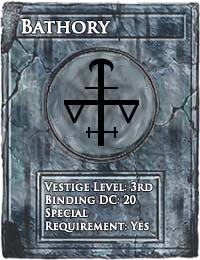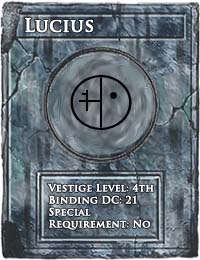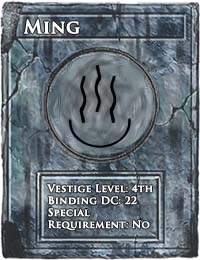The dark days of the 1600s are a strange time for magic. Machines and gunpowder become increasingly prevalent, while at the same time, there is still a deep and profound belief in the supernatural. These times are perfect for binders, who can slip undetected through large cities and make pacts with creatures beyond the veil of the world in exchange for power.
Presented here are three new vestiges created for the 1600s campaign, each representing a tragic or villainous figure from the past. Bathory is a blood-obsessed beauty, and former countess of Hungary. Lucius was once a great Roman general, but was betrayed and bound to a monster before being killed and replaced by it. Ming was a compassionate monk who sought to ease the suffering of the world through its destruction.
Although each of these vestiges can provide a binder with power, care must be taken, lest the binder find themselves making the same mistakes that each had made in life.
Bathory, the Blood Countess
Once she was feared becuase of her insane measures for retaining her beauty, now as a vestige she serves as a warning to not defy the laws of nature.
 Legend: Elizabeth Bathory was a Hungarian countess who had an extreme disregard for the wellbeing of her staff. She was known to have beaten and tortured her maids and cooks for the slightest indiscretion, but underneath her fierce exterior laid a dark secret. The countess was afraid of growing old.
Legend: Elizabeth Bathory was a Hungarian countess who had an extreme disregard for the wellbeing of her staff. She was known to have beaten and tortured her maids and cooks for the slightest indiscretion, but underneath her fierce exterior laid a dark secret. The countess was afraid of growing old.
For years, Elizabeth sacrificed and exsanguinated her staff, bathing in their blood to retain her fading beauty. She lured more in with promises of good pay and an easy life. Finally, a priest's testimony brought her horrific crimes to light. While her many accomplices were tried and executed, her station allowed her to live, albeit secluded in her dark tower.
It was only a short time after her discovery when the so-called Blood Countess finally died alone and isolated in the very place she had killed so many times.
When Bathory got to the afterlife she faced a strange conundrum. Her crimes restricted her absolutely from Heaven, but Hell too shut her out. The number of souls she had sacrificed for her beauty had meant that was she to enter Hell; she would skip her punishment and immediately become a devil of the rank of duchess. The rulers of Hell had debated letting her enter, but finally decided against it. Believing that as a mortal she had accomplished what many lesser fiends take centuries to do, were she to become one of them, she could soon vie for rulership and plunge Hell into a civil war.
Shut out from her afterlife, Elizabeth Bathory traveled on the outskirts of the planes until the many souls she had collected during her life finally merged with her own, providing her power needed to manifest herself as a vestige.
Special Requirement: Bathory requires that you draw her seal in fresh blood. The blood does not need to be from a humanoid, any creature will do, but it must be fresh.
Manifestation: Bathory rises from the center of her seal in a small geyser of blood that doesn't penetrate the outer edges of the circle. She appears as a beautiful naked woman soaked completely in blood. Her throat and wrists have been slashed severely and hang uselessly. Depending on where her head slumps, she sometimes must turn to an odd angle to look her binder in the face.
Sign: A binder who summons Bathory finds that their sweat has been replaced with blood. This causes no harm to the binder, but is extremely disturbing for others to look upon.
Influence: Bathory requires that their binder stay beautiful. The binder must spend at least one hour in the morning, preparing for the day, by combing hair, washing and so forth. This hour is in addition to any time the binder may need to pray, prepare for spells, etc. The binder must only wear clean clothes and must take steps to avoid getting dirty. Bathory does not consider blood to be dirty, and both the blood-sweat manifestation of Bathory's presence (see Sign above) or any foreign gore that the binder may accumulate are exempt from this rule.
Granted Abilities: Bathory provides you with powers that allow you to mimic the abilities of vampires.
Bathory's Light Step: At will, as a standard action, you can activate a spider climb effect on yourself. (Caster level equals effective Binder level.)
Death's Embrace: While bound to Bathory, you are healed by negative energy (such as that created by inflict spells) and damaged by positive energy (such as that created by cure spells).
Embrace of the Vampire: You can make a touch attack that drains the vitality of another as a standard action. This deals 1d6 points of damage per binder level. Once you have used this ability, you cannot do so again for 5 rounds.
Kiss of the Vampire: Your teeth can grow sharp, allowing you to make bite attacks. These deal 1d4 points of damage.
Lucius, the Faceless General
In life, a competent and honorable general, Lucius provides his binders with strength in battle and with leadership qualities.
 Legend: Historians speak of the Roman consul Lucius Mummius Achaicus who led the Roman Legion at the Battle of Corinth, the deciding and early battle in the Third Macedonian War. What most scholars don't know is that Lucius had actually been killed before he commanded the troops.
Legend: Historians speak of the Roman consul Lucius Mummius Achaicus who led the Roman Legion at the Battle of Corinth, the deciding and early battle in the Third Macedonian War. What most scholars don't know is that Lucius had actually been killed before he commanded the troops.
Lucius had looked out over the battlefield and saw that the Greek soldiers he was about to attack only wished to defend their land and their way of life. Being a compassionate and honorable warrior, he was about to send a runner to the Greeks to offer them generous terms of surrender.
However, accompanying his unit were several representatives of a mercantile group that saw an opportunity to destroy a rival in Corinth and required the city in ruins and the people crushed. One of them, a competent wizard, summoned forth a doppelganger and bound the creature to the soul of Lucius with foul magic. The doppelganger assassinated Lucius and took his place as consul, attacking the Greeks without pity and destroying their resistance.
The magic that had given the doppelganger a permanent form had changed Lucius's soul so that it was no longer recognizable to even the gods themselves. He was never collected and remained in Limbo. Over time, as his double performed many deeds, he was toasted and even sacrificed to by his men. Lucius received this worship and as it combined with the parts of the doppelganger's soul he was bound to, he became a vestige.
Manifestation: Lucius strides confidently from thin air into the middle of his seal. He is wearing full Roman battle armor and carrying a crested helmet in his left arm. His skin is slate grey and his face is missing. Instead, he has a pair of faces on the backs of his hands, which talk in turn. Every time he is summoned, the specific faces that appear, change.
Sign: Lucius's sign manifests as a continuous facial tic on the binder.
Influence: Lucius is bitter about his defeat, but still holds to the honor of a true warrior. He requires that you show mercy when asked for it and that you attack anyone who attempts to use Transmutation magic upon you. When under his influence, you always attempt to resist such spells, even if they are harmless.
Granted Abilities: Lucius gives you the power to change your appearance as well as the ability to fight like a warrior.
Aura of Courage: While bound to Lucius, you are immune to fear effects. All allies within 30 feet of you gain a +4 to saving throws to resist fear effects.
Combat Expertise: You gain the benefit of the Combat Expertise feat.
Heavy Armor Proficiency: You are proficient with heavy armor and with shields (but not tower shields).
Lucius's Permutable Face: You can alter the appearance of your form as a standard action. This effect works like the disguise self spell.
Lucius's Shattered Form: Lucius's grip to hold onto the permanent imbues you with the ability to resist all mortal magic that could warp your form. Transformation effects such as polymorph might change your form, but at the start of your next turn you can immediately resume your normal form as a free action. You remain affected by such effects only when you choose to do so.
Lucius's Strength: You gain a +4 bonus to Strength.
Ming, the Brother of Purity
Ming was once a man of noble intentions, but his life's work became an insane obsession that nearly destroyed the world.
 Legend: Ming grew up a monk in the remote mountains of Northern China. In his seclusions, he learned the principles of Buddhism, meditated and soon learned great skills from years of training. Time came when the monk, older now, wished to travel and see the people of China and he left his monastery.
Legend: Ming grew up a monk in the remote mountains of Northern China. In his seclusions, he learned the principles of Buddhism, meditated and soon learned great skills from years of training. Time came when the monk, older now, wished to travel and see the people of China and he left his monastery.
Ming was disheartened by what he saw. Bandits stole from travelers. The Emperor levied heavy taxes on the poorest of subjects. He saw the very worst that the world had to offer and was sickened by the sight.
It was not until years later when Ming met and conversed with a traveling merchant from the west. This man had been to the far off reaches of what is now Norway and had heard tales of the giant golden-haired warriors' gods. One such legend was of a horn that, when blown, would herald the coming of the end of the world.
Intrigued by the possibility of ending all suffering and with perhaps the ability to reshape the world in his image of peace, Ming set forth across the Silk Road and into Europe, where he was able to steal the fabled Gjallarhorn. The monk secreted it away, back to China, where he prepared to remake the world.
Unbeknownst to him, Ming was followed by one of the warriors who revered this sacred treasure and that man in turn was discovered by the Emperor, who sent a band of heroes to stop the monk. In addition, demons had heard of Ming's plans and knew that the monk would never have the opportunity to remake the world and thus, went to him, smiling and offering assistance.
Running from the warriors who were now hunting him, and sending demon after demon to destroy them, Ming traveled to the Big Goose Pagoda where he stole the sacred Buddhist Scrolls and then traveled back to his home monastery. Angered that his former brothers could not see the wisdom in his plans, Ming slaughtered the monastery's inhabitants, but was stopped just in time from blowing the Gjallarhorn.
Destroyed and dead, Ming drifted alone, separated from samsara, the reincarnation he was denied as punishment for his crimes, but his extreme patience, excellent focus and near enlightenment coupled with miniscule divine fragments from both the Gjallarhorn and the Buddhist Scrolls allowed him to become a vestige.
Manifestation: A mighty horn blows and a small insect flutters to the center of the seal. The bug suddenly cracks in half revealing a bird, which in turn cracks in half to reveal a mouse and then a cat, a dog, a pig and finally a man. Ming appears as he did in life, except that pieces of him continually flake or fall off and become small twisted and wriggling creatures, which escape his body, disappearing as they near the edge of the seal. On Ming's back are cockroach wings which flutter nervously as he talks.
Sign: Ming's influence manifests as large black mark on the center of the binder's forehead where their third eye would be located. Binders with access to psionic items or soulmelds which connect to the third eye find that they will not work while this sign is visible.
Influence: A binder controlled by Ming must try to aid somebody in dire need without thought for recompense. Such an act can be as little as giving a few coppers to a beggar or saving a village from bandits. In addition, a binder passing by a horned instrument must make a DC 10 Will save to avoid blowing it once. Once an instrument is blown, Ming is assured that it is not the Gjallarhorn and doesn't need to try again.
Granted Abilities: Ming gives you the skill of a trained warrior and of a musician along with the powers of entropy that he tried to use to erase existence.
Chaotic Strike: Your melee attacks count as magic and chaotic for the purposes of overcoming damage reduction.
Ming's Fists: You gain the benefit of the Improved Unarmed Strike feat. Your unarmed strikes deal damage as those of a monk of a level equal to your effective binder level. This ability does not grant you any other abilities of a monk, such as flurry of blows.
Ming's Skills: You can use Perform checks untrained. In addition, you gain a +4 bonus to Perform (wind instruments) checks.
Musical Madman: You boost the power of magical musical instruments. Any magical item that requires a Perform check to activate has its save DC (if any) increased by +1 when you use it.
Strike of Entropy: As a swift action you can charge a melee attack or a melee touch attack so it deals +1d6 points of damage. This damage is untyped magical damage, so it is not affected by energy resistance or damage reduction. This damage becomes +1d8 when used against objects, constructs or undead creatures.
Bind Vestige and Improved Bind Vestige
Bathory can be selected by a player who takes either the Bind Vestige or Improved Bind Vestige feats (Tome of Magic). The Bind Vestige feat provides players with Bathory's light step, while Improved Bind Vestige provides them with kiss of the vampire.
Using these Vestiges in Other Campaigns
These vestiges all use mythology relating to our world, but can easily be adapted to fit into other campaign settings. Bathory's kingdom can be changed to any European-styled country that is convenient, especially if there is a prevalent undead presence there. Lucius could come from any ancient civilization which may have long passed. Ming could be from any Oriental setting, and may be a transplant from there.
Overall, the particulars about the origins of each of these vestiges are unimportant and can be adapted to fit any setting with minimal effort, as long as their associated flavor remains the same.
Notes:
Bathory is based upon Elizabeth Báthory, a countess who lived in Hungary between the mid 16th and early 17th centuries, and is one of the people whom the fictional Count Dracula is based upon.
Lucius is a minor NPC from the Greek Campaign. Although he never appeared in the game, he was a constantly mentioned opponent, whom the heroes were ultimately denied a confrontation with. He is based on the real-life Roman general Lucius Mummius Achaicus who destroyed Corinth in 146 BC. The utter destruction of the city was remarked on by authors at the time as being uncharacteristic of him.
Ming is the main villain from the Chinese Campaign. Unlike the other two vestiges here, he is a wholly fictional creation and has no basis on any historical figure.



